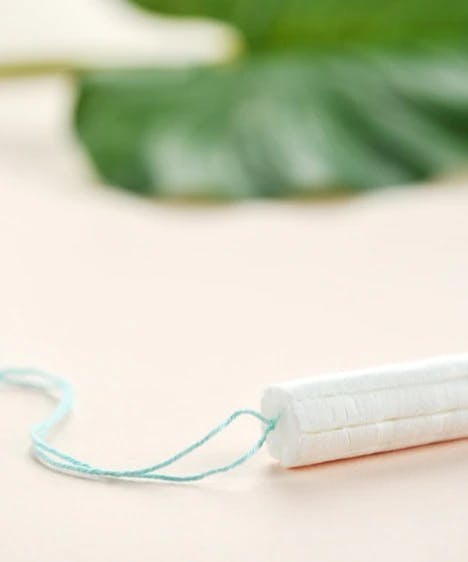Do We Really Need To Use Organic Tampons?
The feminine hygiene aisle: it's that place we end up going once a month. From Tampax to Playtex to Kotex (Can someone tell me why all these brands end in the letter x?), it feels like there are a whole lot more options on the shelf these days, including “natural” and “organic” tampons.

While most of us don’t question whether or not organic fruit and veggies are safer, we might still be on the fence about tampons. Getting your period is hard enough without having to worry about whether or not your feminine hygiene products are potentially toxic. So I spoke with Dr. Jodie Horton, MD and Love Wellness advisor, to find out whether we need to make the switch to organic or if the tampons we’ve been using this whole time are just fine.
Getting your period is hard enough without having to worry about whether or not your feminine hygiene products are potentially toxic.
What are conventional tampons made from?
Ever wonder what you're putting inside your body? According to Dr. Horton, tampons have both natural and synthetic components. "The absorbent core is made of plant-based cotton and a synthetic component called rayon. The fabric around the absorbent core is made of polyethylene and polypropylene,” she says.
What are organic tampons made from?
Organic tampons are made from 100% organic cotton with the claim that no pesticides were used. But Dr. Horton explains that this doesn’t tell the whole story. Some organic tampons are inserted with a plastic applicator that could have BPA, unless the label notes otherwise.
What about chemicals?
Unfortunately, conventional (and sometimes even organic) tampons are filled with harmful chemicals, according to Dr. Horton. Examples include aluminum, alcohol, fragrance gels, pesticides, and other additives. And to make matters worse, there’s no real way of finding out what’s exactly in there.
Tampons are filled with harmful chemicals.
“Companies can voluntarily provide a suggested ingredient list on their label, but they are not required to disclose the chemicals or materials that are used in making feminine hygiene products to the public,” she says.
She notes another concern is the toxic byproducts known as dioxins that may be produced from bleaching cotton (yes, even organic cotton) and rayon. "Non-human studies showed a potential link between dioxin and endometriosis."
However, according to the FDA, the levels of dioxin vary between brands, and the levels do not exceed tolerable levels. So you should be safe, but if you’re worried, Dr. Horton suggests checking the labels. “Some larger companies state that they only use elemental chlorine-free bleaching which does not create dioxins during the bleaching process.”
So, should we legitimately be worried about using tampons?
Yes, but not for the reason you think. Any tampon can potentially cause toxic shock syndrome (TSS), which is a rare but potentially fatal disease caused by a bacterial toxin. “The risk of menstrual-related TSS has decreased since the regulation of the materials and absorbency of tampons. Synthetic materials that were used to enhance the absorbency of tampons were removed because they were associated with increased production of TSS toxin,” explains Dr. Horton.
Change your tampon every four to eight hours and use the lowest absorbency possible for your flow.
If you’re concerned, she recommends changing your tampon every four to eight hours and using the lowest absorbency possible for your flow. So, if you’re on a light day and just dying to finish up that pack of Super Plus under the sink, it’s better to save it for next month and head out to the drugstore instead.
So what’s the verdict?
According to Dr. Horton, there is no scientific evidence to date that says that organic tampons are safer than conventional tampons. However, “it is important to read the labels, do your research, and use tampons as directed."
Conclusion
Keep in mind that tampons aren’t the only way to take care of menstruation. So, if you're concerned about any potential side effects, consider an alternative like old school pads or a menstrual cup.